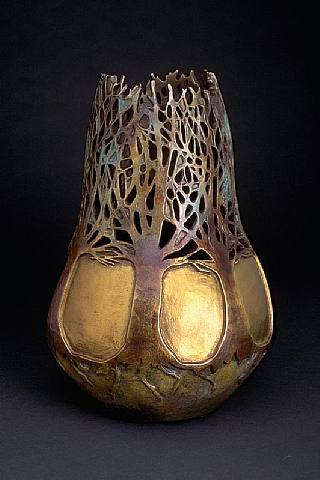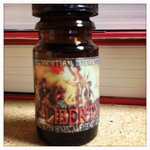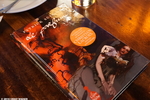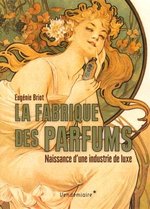Frederic Malle on Perfume Publishing {Fragrant Reading}

There is a Q & A with Frederic Malle in the San Francisco Chronicle. Malle describes his work as an editor of perfumes. He is largely responsible for a movement that puts the perfumer center stage and gives him or her the status of author. A perfume for him without doubt can be a piece of art, on a par with a painting by Matisse. Short formulas, like short pieces of writing, are more difficult to achieve because only the essential is expressed.
This set of beliefs represents modern ideas that are still debated. Some perfumers do not seem to care about authorship in the sense of it being individualistic and like to stress collaborative efforts; the model of film director or screenplay writer might better apply. Some perfumers will probably still see themselves as sophisticated urban artisans rather than Picassos. There was also a time once when perfumers took pride in creating complex formulas. Joséphine Catapano with Norell comes to mind about which she said "We all knew the formula was long, like a treaty" (note the "we"), as well as Ellena with the 160 ingredients in First (but he has since then evolved to embrace the position that it is a less interesting approach to take). More recently, a German perfume made by Frank Rittler, Steffen Schraut, still boasts "about 120 natural essences"..........
"Q: Are perfumers a temperamental lot? What are they like to work with?
A: You're dealing with artists, and they are human beings. Some of them need more guidance, others need only a vague indication that will trigger their own minds as to what the fragrance needs. Perfumers all work for big companies these days in big labs; it's like Hollywood in the '30s. My nine perfumers also work in these labs; most have been making perfume for 20 years or more. The average age is about 45 to 50. I might speak to one on the phone, others want to speak to me in person, it just depends. I either give them an idea or vice versa, but my job is to adapt to each individual. What I want to give them is the freedom from the big companies, to create a sort of haute couture fragrance."
Read more.......
(Artwork available at Virginia Miller Galleries.)










"Some perfumers do not seem to care about authorship" - because they work mostly in big labs and ... as they scent almost everything in this world it would be pretentious for some of them to call themselves artists/authors and act as a writer. While a writer would have 3-10 good books in his life and would accentuate the autorship idea ... a perfumer would create hundreds of smells put on the market. What is known (the big names, Fr Malle) is just a small part of their work.
Also brands would not put perfumes in front. In the end, the product and the brand must "shine" and not the perfumer. Malle understood that and did the contrary.
Also, when you create perfumes for brands in competition ... those brands would not want to accentuate your name or even put in on the bottle.:)
I think it is also a question of mentality (shifts in mentality can be slow) and personality. Some perfumers stress that they don't care really as long as someone tell them it's all going to be about making a good perfume cf. an article in the NYT last year.
I personally am generally more struck by analogies with the film-making process based on team work than solitary authorship (even with an editor). But in some cases, yes, perfumers could be more like authors.
By the way, there are writers known for having written just one good book. There is an Italian novelist, who was an engineer, but wrote a great single novel; can't remember his name!
I support his concept but why is it perfumers who have complete freedom came up with non groundbreaking and non exceptional scents? to the exception of Lipstick Rose and Iris Poudre I find the Frederic Malle editions to be average fragrances.
one can hire the most talented laboratory nose geeks but if you don 't have someone behind to give directions such as the highly educated Serge Lutens or in her times Coco Chanel who had a strong vision of what a woman 's perfume should and should not be, at best you 're going to come up with something very technical but this won 't be a masterpiece!
The way a masterpiece appears (even in art) is mysterious and unknown. You cannot propose yourself and it is dangerous for you (as an artist) to think: I will do a mastepiece and next year a will do another 3. Sometime things just happen, sometime when all the conditions are met ... nothing happens.
Serge Lutens perfumes are great ... because he is great and he came with his personal story and taste at the right moment. But I don't think he started with the idea to create the ultimate masterpiece (opus magnum) in the world.
Some perfumers think the contrary ... and they succeeded.
Roudnitska was a very proud men who thought of himself beeing the best perfumer in the world. Reading all his writings now you get the feeling of how proud he was ... and beeing modest or humble was not his type at all.
Even when you look in great musicians/painters life you will find exceptional things and works that are ... mediocre (but are famous because of the name).
Complete freedom could be dangereous some time.
But for Frederic Malle ... the question of complete freedom is a "story" (nobi had a post on that on his blog).
I think that Aline et Valcour raises a complex question because it implies that perfumes can all be equally judged as works of art while in reality it would be completely unfair to ignore a host of perfumes that smell very good without aiming to be more than perfumes in a very honest sense.
If one raises the bar like that for the Frederic Malles, then one would need to sit again and apply different sets of criteria. But for the moment being, "average" is not the first word that comes to mind for several of the Malles -- but it is an interesting question to ask. When perfumers take pride in emphasizing the exceptional quality of their ingredients, is this an "average" approach? If it is art, shouldn't it be liberated from this material constraint and be able to express itself freely with all sorts of materials, the equivalents of plastic, cement, paper, what not? Wanting to preserve the luxury aspect of perfumes, is, in and of itself, very bourgeois and conformist. Wanting perfumes to smell rich, ample, diffusive is somewhat a constraint on perfumes as objects of art. But perhaps, it is difficult to escape the sensualist aspect of perfumes and the fact that olfaction is geared towards wanting to recognize and repeat pleasing sensations rather than challenging ones.
I 'm wearing Kelly Caleche today wich I really love, a little masterpiece in my opinion because it 's non pretentious, easy to wear, sort of high end mainstream category but not niche, smells very natural, it 's sexy and extremely pleasant. Ellena did his best here with this new Hermes fragrance inspired by classic Hermes elements such as the Kelly bag and their historic leather production site taking his minimalist olfactory illusions and non literal execution style to a new level of simplicity, feminity and beauty.
I think this is his best fragrance since Rose Poivree; the Hermes restrictive guidelines and framework he was working with helped him here. in comparaison the scents he created for Frederic Malle are disappointing although he had complete artistic freedom.
Octavian, I agree that nobody should start anything with the idea of creating a masterpiece or you can only set yourself for failure but I do think in the case of Serge Lutens he had envisioned right from the start a line with a determined concept. his perfume line wouldn 't be as cohesive and creative as it is today if he wasn 't the extremely cultured perfumer he is who has an artistic and intellectual point of view. his perfumes taken individually are not necessarily unique works of Art but his line as a whole is. I couldn 't say the same for the Malle editions which suffer a lack of consistency in execution and concept.
Marie-Helene, I don 't mind elitism and the most precious rarest fragrance ingredients only if it 's intellectual and challenging. you are so right here, the perfume industry is so caught up with this luxury image; this is exactly what Victoire Gobin Daude told me when I spoke to her three years ago, in France perfume is marketed as a luxury product, her botanical independant style didn 't find a market.
M-H, when you write "If it is art, shouldn't it be liberated from this material constraint", you are pinpointing one of the the major reasons for perfume not being one of the "fine arts". Though some houses such as Comme des Garçons have carried out their conceptual raison d'être by playing with such notes, the overwhelming majority of perfumes, even niche perfumes, aim to be pleasing, and worn. In this respect, and because they are produced in series, they are much closer to the "arts appliqués", design or fashion. These restrictions -- pleasing at least some customers, and needing to be produced in large quantities -- restrict the art of perfumery. Composers accept this restriction and work within its limits. Again, your analogy with cinema seems valid, M-H: think of the restrictions of classic Hollywood movies. They did indeed yield masterpieces working within those restrictions. But their process, as in perfumery, cannot be compared with, say, the plastic arts since Marcel Duchamp.
Yes, I agree that perfumes are more commonly found to be closer to the field of "arts appliqués" as you write, or applied arts.
Nevertheless they can work with a memory and temporal dimension, a psychological depth that make them be, sometimes, something a little different. When I smelled Louve for example, I felt it was more than the product of a decorative art. It was profoundly moving, like music, a segment in a movie that is a masterpiece.